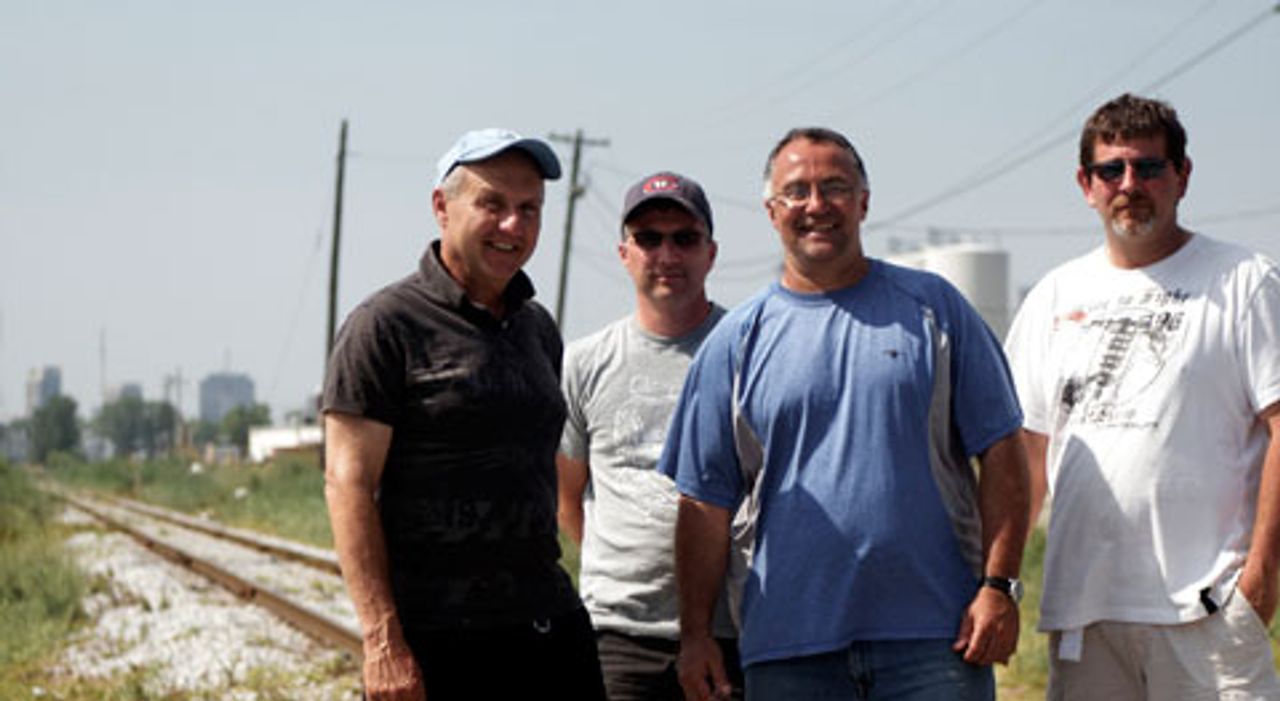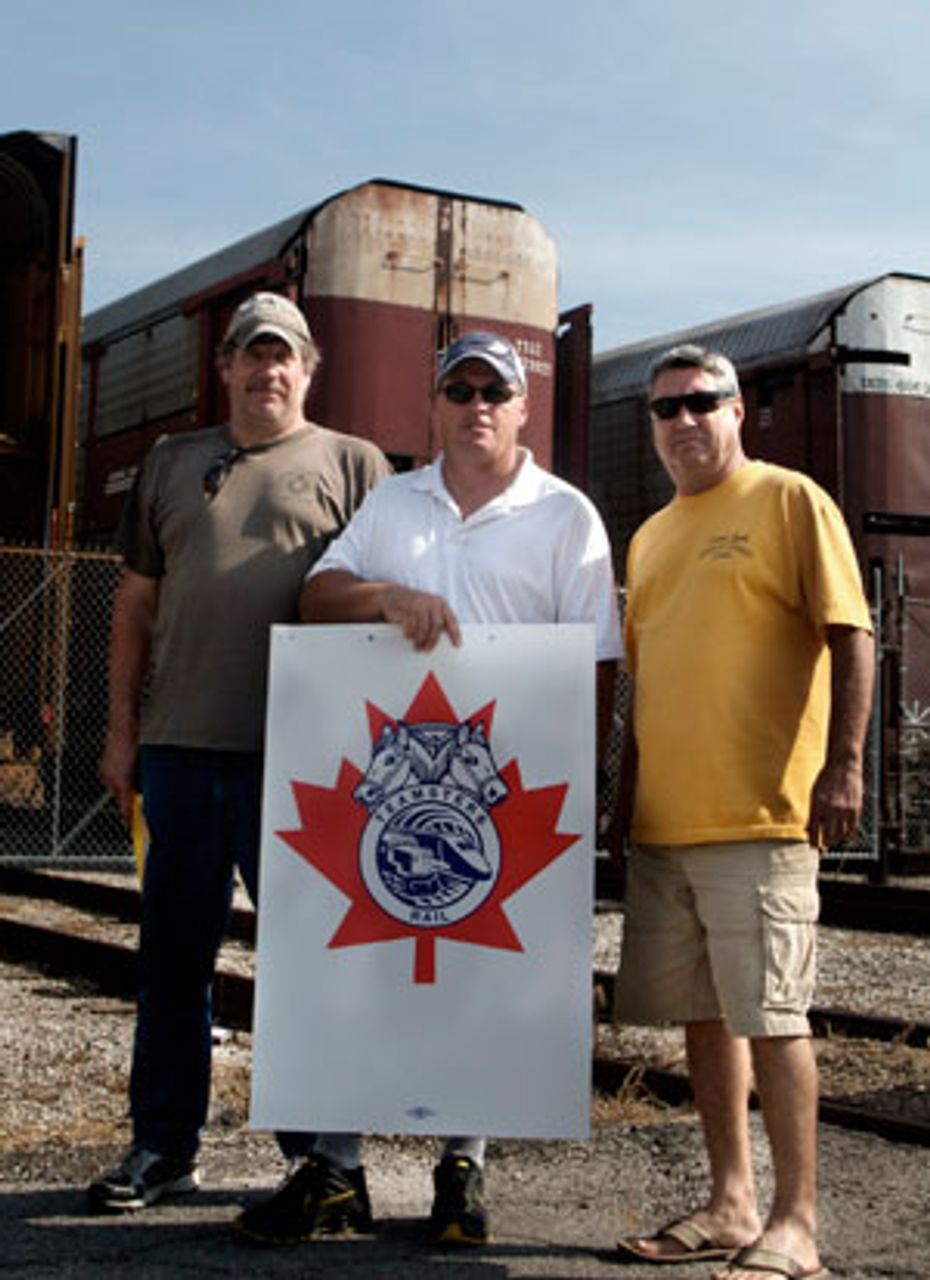On Wednesday morning, 4,800 Canadian Pacific (CP) railway workers went on strike against company demands to reduce pensions by up to 40 percent and increase the already grueling pace and length of work. Within hours of the walkout, Conservative Labour Minister Lisa Raitt gave notice she intended to table back-to-work legislation if a settlement was not reached by the time the federal parliament reconvenes this coming Monday.
The strike has stopped shipments of fuel, grain, minerals, automobiles and other bulk goods that are transported along CP’s extensive rail network that stretches across Canada from Vancouver to Montreal and into the United States.
Raitt issued the threat to strip workers of the right to strike after appeals from a variety of big business interests, which can no longer countenance any resistance to the corporate drive for speed-up and wage and benefit cuts. Among them, Mark Nantais of the Canadian Vehicle Manufacturers Association wrote Raitt to complain that the assembly plants of the Detroit Three automakers would be affected within hours, just when they were “experiencing a positive but fragile recovery.” Pierre Gratton, CEO of the Mining Association of Canada implored, “A strike by CP workers will have a serious effect on the industry. The shipment of fuel and other supplies to mine sites will be compromised as is the transport of mineral products.”
In any event, Raitt needed little convincing, claiming at Wednesday’s press conference that a prolonged strike could impact the Canadian economy to the tune of $540 million per week. By late Wednesday night, CP announced that it has already laid-off 2,000 non-striking workers who have been idled by the industrial action.
In the face of Raitt’s threats, the Teamsters union, which organizes CP’s conductors, engineers, rail traffic controllers and yard workers, has made it clear it will do nothing to mobilize workers against the illegalization of the strike. Indeed, the union has already allowed CP’s lucrative commuter services in Toronto, Montreal and Vancouver to run normally and has given similar concessions to much of CP’s across-Canada passenger services. Rather than oppose the anti-strike legislation, the union is prepared to continue “negotiations” after a forced return to work.
For their own part, the trade union backed New Democratic Party (NDP) which sits in opposition to the Conservatives in Ottawa has signaled its readiness to go along with the strike-breaking operation of the Harper government. Olivia Chow, NDP parliamentarian from Toronto and wife of the late party leader, Jack Layton told the CP24 news network that her party “would have to see the language of the order” before deciding whether to vote for or against. Chow then said that Raitt should have simply waited until Friday to announce the back-to-work threat in order to allow “free” negotiations to continue.
Raitt’s threat to end the CP strike is part and parcel of a policy by the Harper government to smash the living standards of whole swathes of the Canadian working class. Over the past year, the federal government has repeatedly intervened to prevent or break a series of strikes at Air Canada and also at Canada Post.
Earlier this spring, Raitt outlawed job actions by 8,600 Air Canada ground crew workers and 3,000 pilots through a spurious request to the Labour Board to rule on whether a strike or lockout would endanger the “health and safety” of Canadians. Soon after, the Conservatives rammed legislation through parliament “suspending” the workers’ right to strike. The anti-strike law included language crafted to ensure that the government-appointed arbitrators will determine that the workers’ terms of employment is based on the company’s concession demands.
Raitt made similar pro-company interventions against Air Canada customer service agents last June, using the threat of a government-imposed settlement to bully the workers into a last minute concessions deal and against flight attendants when they threatened to strike last October.
And last summer the government enacted legislation outlawing a strike by 48,000 Canada Post workers. That law was crafted to ensure that the government-appointed arbitrator charged with dictating the contract under which the postal workers will work for the next four years is legally compelled to impose the sweeping concessions sought by management. It also imposed a wage settlement inferior even to that offered by Canada Post.
The Conservatives’ aggressive intervention against striking workers has broad and chilling implications. Under conditions where the ruling elite is moving to impose sweeping cuts in public services, in the name of eliminating government deficits, and employers, citing ever-increasing foreign competition, are moving to abolish guaranteed pensions and other basic rights, the Harper government has demonstrated that it will use the full force of the state to criminalize and suppress workers’ resistance.
 Ray Vigneux (center) with fellow conductors
Ray Vigneux (center) with fellow conductorsA WSWS reporting team visited the Canadian Pacific freight yard in Windsor, Ontario. Ray Vigneux, a conductor with 39 years experience is chairman of Teamster Canadian Rail Conference Division 528. He reported that no freight locally was moving. He told the WSWS that a typical worker in the yards makes between $52,000-$65,000 a year.
“One of the company’s demands is a change in our pension. A high-end pensioner could be reduced as much as 40 percent. They want to put a cap on pensions similar to CN [Canadian National railway]. The pension was a big selling point for younger workers. That is what we live for.
 Ray Vigneux
Ray Vigneux“They also want to go after benefits. They want benefits to cease at age 65. Our benefit plan isn’t all that great to begin with. When we show up for work they want to be able to keep us 12 hours. It is a demanding lifestyle as it is, being woken up at two o’clock in the morning, working in the snow and cold. Under the current contract they have the right to keep us 10 hours. That’s enough—12 hours is taking a step backward.”
He explained his work. “Conductors make up a train. We don’t load trains, we build trains according to destination. It’s like a puzzle. We put all the destinations together. We take it through the tunnel and leave it in the rail yard in Melvindale, Michigan. Auto products are the big thing, as well as fertilizer and potash. It is one of the biggest spots crossing into the US. There are approximately 12 trains each day.
“We don’t want to lose what we have. I put up with some God-awful shifts and God-awful times. You work under terrible conditions. You are in the dark. Then you have snow. You are aligning switches. The temperature changes from hour to hour, making it harder to pull the switches. We climb on top of freight cars. If you have a 7,000-foot train you have to walk over a lot of rough terrain.”
Ray commented on Canadian Pacific’s recent announcement that it had record first quarter profits. “You can’t announce those kind of profits and say you need to reduce pensions. It’s mind-boggling.”
Mark Roberts, a retired CP worker, was at the picket line to show his support. “My dad is a retired engineer and my brother is an engineer out of London. A 40 percent cut in pensions is pretty drastic. There is no loyalty to the worker. It’s about the bottom line.”
He commented on the attack carried out on Caterpillar electromotive workers in London, Ontario where the company recently imposed a lockout and then closed the plant, shifting work to Muncie, Indiana in the United States for far less pay.
“You saw what happened in London? They wanted to take half their wages. It’s dog eat dog in the recession. You can’t put your kid through college on what they are now paying.”
 Greg Demers, an engineer for 22 years, Dave Boxall,
Greg Demers, an engineer for 22 years, Dave Boxall,a conductor for 25 years, and AJ McGuinness,
a conductor for 39 years
Dave Boxall, a conductor, said, “What they want is crazy. You have guys who have put into this pension for 25 years. If someone has based the whole career on it, it is a big issue. The company is not budging on anything. The bottom line is money. They want to make it a slave labor country. How much money do they need to make? If the company wants to cut costs and improve efficiency, they should ask us. Even now, there are three or four diesel train engines idling in the yard for no reason. Instead, they come after our pensions.”
He voiced support for the striking students in Quebec who are facing legislation that has virtually criminalized their struggle. “The students are getting robbed. It is craziness. I hope they keep on fighting. It was good to see that many people out protesting.”
Adrian McGuinness, a conductor with 39 years experience said, "We’re on call 24/7 almost every day of the week. Most of us have never seen our kids’ graduations; there is no family life in this job. They preach family, but they don’t do anything about it. There are no sick days. If you are sick it is out of your pocket. You have earned a day off, but you still don’t get paid for it. In order to get paid you have to be hospitalized or under a doctor’s care, and then insurance pays.”
